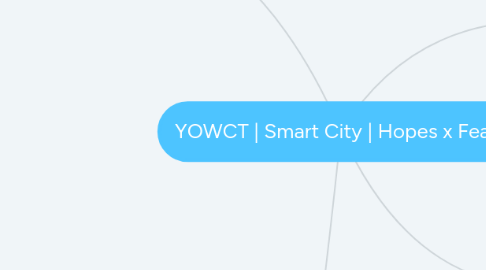
1. Thematic look at Hope/Fears
1.1. Socio-economic impact
1.1.1. Short sighted/ short term
1.1.1.1. Fear: expensive total cost but with "free"-looking initial cost; cost comes with corporate lock-in / walled gardens
1.1.1.2. Fear: Tech exceptionalism and tech exclusionary
1.1.1.3. Vulnerable populations further victimized
1.1.1.3.1. Fear: technology used to pray on or isolate vulnerable citizens; less democracy
1.1.1.3.2. Fear: growing digital inequality (digital illiteracy)
1.1.1.4. The gains are short lived
1.1.1.4.1. Fear: it's just another fad/gimmick
1.1.1.4.2. Fear: it's one dimensional (e.g. just Autonomous Vehicles
1.1.2. Hope: greater economic opporutnity
1.1.3. Hope: social and economic benefits
1.2. Bureaucratic inertia
1.2.1. Fear: Government not being agile/open to the use of data
1.3. Data
1.3.1. Hope: It will provide insights on citizen behavior
1.3.2. Hope: more data-driven planning at the city level
1.4. Privacy
1.4.1. Fear: Security holes
1.4.2. Fear: lack of privacy
1.4.3. Fear: loss of privacy
1.4.4. Fear: surveillance on a broad level that sells indivudal rights
1.5. Governence
1.5.1. Fear: unregulated tech leading to problems
1.5.1.1. lack of privacy
1.5.1.2. increased stress
1.5.1.3. ...
1.5.2. Hope: Every one has the same opportunity to succeed
1.5.3. Hope: community empowerment
1.5.4. Hope: Greater government efficiency
1.5.4.1. e.g. Estonia
1.5.5. Hope: more confidence in municipal democracy and municipal governments
1.5.6. Decision confidence
1.5.6.1. Fear: moving withing including small local business in ways that they control
1.5.6.2. Fear: Increasing disconnect / divides among communities
1.5.6.3. Hope: Citizens can see understand how their quality of life will improve
1.5.6.4. Hope: greater sense of citizen involvement stemming from real consultation; people are heard and feel that they're heard
1.5.6.4.1. Fear: only those who participate and can don't have time poverty?
1.5.6.5. Hope: Many voices are heard
1.5.6.6. Fear: Less understanding of citizens about democracy
1.5.6.7. Hope: More inclusive decision making
1.5.6.8. Fear: still biased and unrepresentative decision making
1.6. Service delivery
1.6.1. Hope: alignment; in use by multiple cities
1.6.2. Hope: municipal services offered through secure digital environemnt
1.6.2.1. 311
1.6.2.2. parking permits
1.6.2.3. construction + trades permits
1.6.2.4. Hope: Bridges city/rural devide
1.6.2.4.1. access to city services digitally in rural areas
1.6.3. Hope: government as platform
1.6.4. Hope: effective service delivery
1.6.5. Hope: value for money
1.6.6. Hope: accomplish creating a platform of generating many little successes that percolate across the country
1.6.6.1. e.g.
1.6.7. Fear: if something is broken or doesn't work... really annoying
1.6.7.1. e.g. "Internet of Shit"
1.7. Environmental impact
1.7.1. Hope: more eco friendly city
2. Other discussion
2.1. How can we win the battle over what cities want?
2.2. What output can we produce to help shape the outcome?
2.2.1. Knowledge/library
2.3. What are we measuring? / What do we want to know?
2.3.1. do we even know?
2.3.2. Making things easier / removing barriers
2.3.2.1. e.g. Hamilton
2.3.3. Lack of complaints?
2.3.3.1. Do cities make it easy to give kudos?
2.3.3.1.1. an easier way to see
2.3.4. Making the city more human
2.3.5. How do you measure the unquantifiable?
2.4. Allies
2.4.1. media
2.4.2. FCM?
2.4.2.1. Do we need to divide the "Smart" and the "City"?
2.4.2.1.1. How do they categorize citizens, infrastructure?
2.4.3. Civil society groups w/ smart city agendas
2.4.3.1. Open North
3. Hopes
3.1. Hope: greater economic opporutnity
3.2. Hope: social and economic benefits
3.3. Hope: more data-driven planning at the city level
3.4. Hope: It will provide insights on citizen behavior
3.5. Hope: Every one has the same opportunity to succeed
3.6. Hope: community empowerment
3.7. Hope: Greater government efficiency
3.7.1. e.g. Estonia
3.8. Hope: more confidence in municipal democracy and municipal governments
3.9. Hope: Citizens can see understand how their quality of life will improve
3.10. Hope: alignment; in use by multiple cities
3.11. Hope: municipal services offered through secure digital environemnt
3.11.1. 311
3.11.2. parking permits
3.11.3. construction + trades permits
3.11.4. Hope: Bridges city/rural devide
3.11.4.1. access to city services digitally in rural areas
3.12. Hope: government as platform
3.13. Hope: effective service delivery
3.14. Hope: value for money
3.15. Hope: accomplish creating a platform of generating many little successes that percolate across the country
3.15.1. e.g.
3.16. Hope: more eco friendly city
3.17. Hope: greater sense of citizen involvement stemming from real consultation; people are heard and feel that they're heard
3.17.1. Fear: only those who participate and can don't have time poverty?
3.18. Hope: Many voices are heard
3.19. Hope: More inclusive decision making
4. Fears
4.1. Fear: it's just another fad/gimmick
4.2. Fear: it's one dimensional (e.g. just Autonomous Vehicles
4.3. Fear: Government not being agile/open to the use of data
4.4. Fear: Security holes
4.5. Fear: lack of privacy
4.6. Fear: loss of privacy
4.7. Fear: surveillance on a broad level that sells indivudal rights
4.8. Fear: unregulated tech leading to problems
4.8.1. lack of privacy
4.8.2. increased stress
4.8.3. ...
4.9. Fear: if something is broken or doesn't work... really annoying
4.9.1. e.g. "Internet of Shit"
